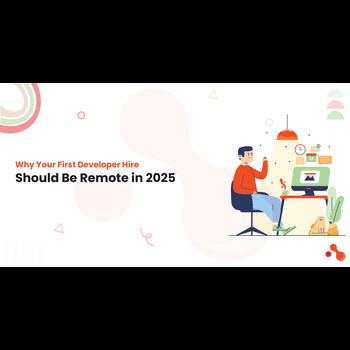


Discover why hiring remote teams in 2025 is a game-changer for startups and enterprises. Learn how to scale faster, smarter.
The way we work has been rewritten—2025 isn’t just another page in the calendar; it’s a defining chapter in how teams are formed, grown, and empowered. Startups and legacy companies alike are facing a new truth: the future of building strong, scalable remote teams starts remotely.
In this article, we’ll explore why consider remote development first in 2025. It expalins why outsourcing is a smart option that could set you ahead of the curve.
Hiring web developers in 2025 presents both opportunities and challenges for startups and well-established businesses, shaped by evolving tech stacks, remote work norms, AI integration, and global talent availability.
The current trends involve businesses preferring a global talent pool with AI proficiency and one that implements automation. They also prefer shorter tenure norms.
Remote work is no longer a trend; it’s become the default setting in the global tech ecosystem. Software development companies worldwide now support fully remote or hybrid models. From AI engines to banking platforms, distributed teams are proving that geography is no longer a limitation to technical excellence. If you’re planning to scale efficiently, learning how to build a remote team the right way is crucial for long-term success.
The most compelling reason to hire a remote developer first is immediate access to a truly global talent pool. Confining your search to a 50-mile radius around your physical office is akin to fishing in a puddle when an ocean of world-class talent awaits.
The sooner you build, test, and iterate, the faster you reach product-market fit. Local hiring cycles, however, are notoriously slow—often taking 6–8 weeks per developer. Remote hiring compresses this timeline. This rapid access to execution power is essential when you’re racing to validate an MVP or enter a competitive market.
Diverse teams build better products. A remote-first hiring approach exposes your company to developers from various backgrounds, time zones, and cultures. This diversity fosters innovation, helps uncover edge cases early, and leads to more inclusive product design.
Hiring someone fresh out of a coding bootcamp might be budget-friendly, but it comes with a training cost. Remote developer hiring, on the other hand, gives you access to developers who are project-ready from day one.
When hiring locally, your team sleeps when you sleep. Remote development lets you distribute work across time zones for around-the-clock productivity. For enterprises running global operations, remote developers ensure continuity even during regional holidays or disruptions.
Do not let the myths about remote developers detail your project. These outdated perceptions often prevent companies from accessing a global talent pool, increasing efficiency, and building a resilient team. Here are some of the misconceptions:
Choosing to hire remote developer in 2025 isn’t about jumping on a bandwagon. It is in fact a smart decision and strategic move which will open the doors to cost efficiency, productivity, exceptional talent, reduced overhead. It will empowers your team to scale smarter and faster.
The best minds aren’t confined to any one city or time zone. So why should your hiring strategy be? Whether you’re bringing an MVP to life or reimagining your tech team from the ground up, starting remotely puts you ahead from day one.
The future of development is distributed. Lean into it—and watch your vision take flight.
Orignial Source: https://medium.com/@mukesh.ram/why-your-first-developer-hire-should-be-remote-in-2025-0850ca5349e2
